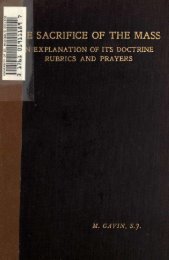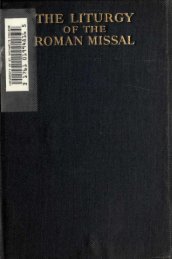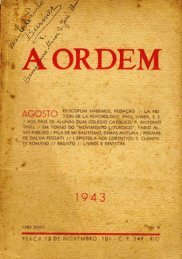E SACRIFICE OF THE MASS
E SACRIFICE OF THE MASS
E SACRIFICE OF THE MASS
You also want an ePaper? Increase the reach of your titles
YUMPU automatically turns print PDFs into web optimized ePapers that Google loves.
26 <strong>THE</strong> ORDINARY <strong>OF</strong> <strong>THE</strong> <strong>MASS</strong>.<br />
Father, from whom all power springs, and of the Son<br />
who became Man and died for us on Calvary, and of the<br />
Holy Ghost proceeding from the Father and the Son,<br />
the Teacher of truth and the Sanctifier of the world, the<br />
priest begins the great Sacrifice. The sign of the Cross<br />
reminds us by its form of our Lord s Death on Calvary.<br />
The sign of the Cross as made on forehead, breast, and<br />
shoulders is said to be of Apostolic origin. Some have<br />
thought that our Lord on Ascension Day blessed His<br />
disciples, before He was hidden by a cloud, with the<br />
sign of His Cross. Tertullian, writing at the end of the<br />
second century, says,<br />
" At every moving from place to<br />
place, at every coming in and going out, in dressing,<br />
at the baths, at table, on going to rest, sitting down,<br />
we sign ourselves on the forehead with the Cross." The<br />
sign of the Cross is used in all the Church s Services,<br />
in the administration of the sacraments, in all her<br />
blessings except in the blessing of the Paschal candle.<br />
Amen is a Hebrew word meaning "so be it;" it<br />
expresses the desire that our prayers be heard, and it<br />
fortifies the good resolutions taken.<br />
The three languages used in the inscription on the<br />
Cross, "Jesus of Nazareth, King of the Jews," namely,<br />
Hebrew, Greek, and Latin, are found in the Mass.<br />
Sabaoth, Cherubim and Seraphim, Hosanna, and<br />
Amen, are Hebrew; Kyrie Eleison is Greek, and the<br />
Liturgy of the Mass is Latin, at least in the Roman<br />
Church.<br />
The priest joining his hands begins the antiphon of<br />
the 42nd Psalm.<br />
Ant. Introibo ad altare Dei. Ant. I will go unto the altar<br />
of God.<br />
R. Ad Deum qui laetificat ju- R. To God, who giveth joy to<br />
ventutem meam. my youth.






